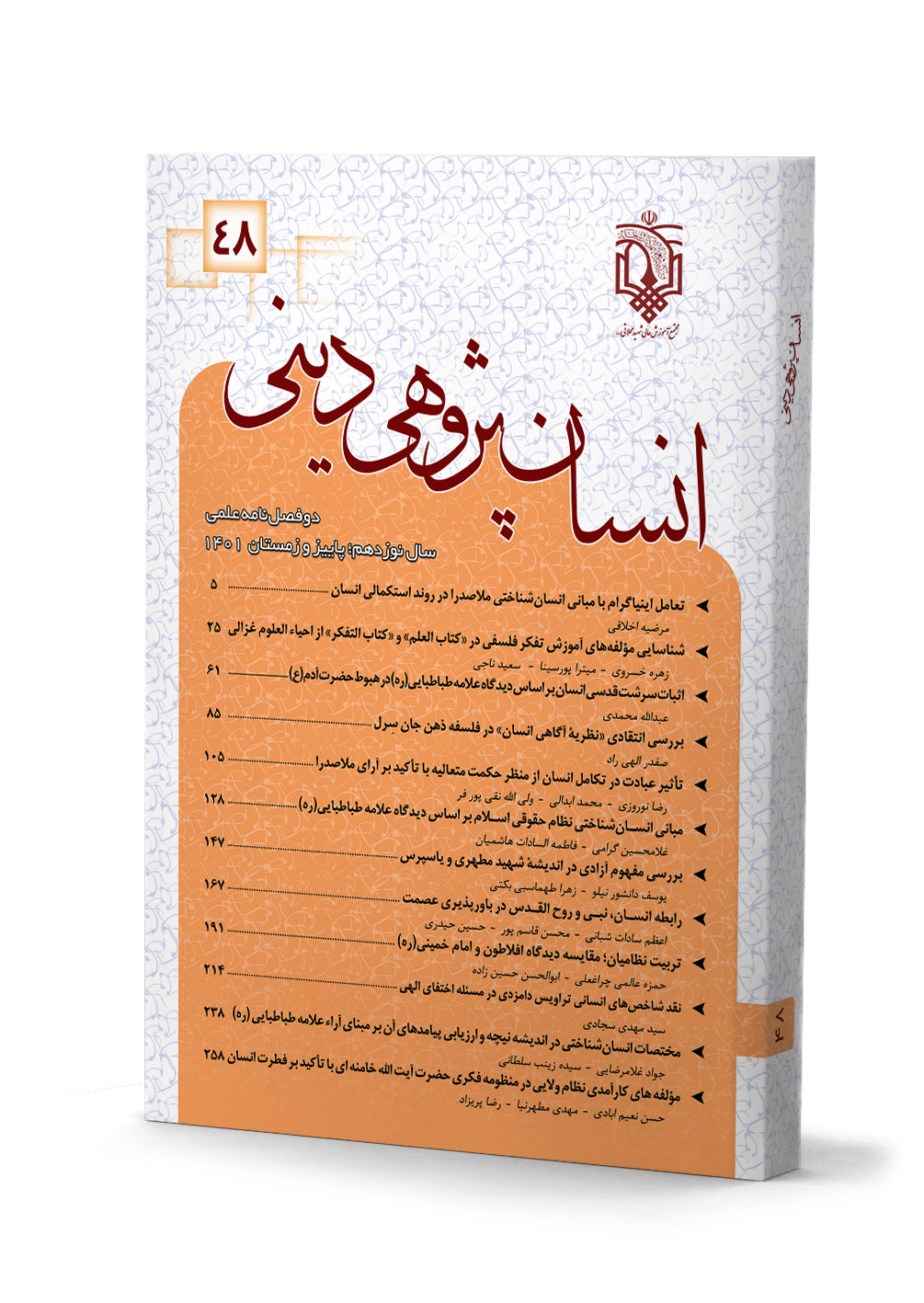A Critical Analysis of “Man’s Consciousness Theory” in John Searle's Philosophy of Mind
Document Type : Research Paper
Author
Assistant Professor of Theology and Philosophy of Religion, Imam Khomeini Educational and Research Institute
10.22034/ra.2023.548539.2748
Abstract
Explaining the nature of mental phenomena, particularly consciousness, is among the most important issues in the philosophy of mind and contemporary anthropology. Western and Islamic philosophers have regularly commented on this issue but, due to the recent development in cognitive sciences including neurology and artificial intelligence, the analysis of “consciousness” is largely disputed. Searle is a contemporary analytical philosopher who, in his own opinion, has presented an innovative approach for solving the issue of “consciousness” and its relation with brain and nervous system. According to him, the equality of consciousness and physical affairs is denied and Cartesian dualism is avoided. Issues such as consciousness are characteristics of brain cortex and effect of brains’ internal processes. In Searle’s view, causality of brain’s internal parts and characteristics of its cortex can solve the challenges associated with the relationship between body and mind. The present research has adopted an analytical-critical method to explain Searle’s view and analyze it critically. It was revealed that, on one side Searle’s analysis of the causality of intercellular parts is violated and on the other, realization of consciousness in the brain is impossible. Searle also fails to provide robust evidences on his claims.
Keywords
- اوجینو کاوانا، آندره و نانی، آندره (1396)، نظریههای آگاهی در فلسفه ذهن و مغز پژوهی امروز، ترجمه سعید صباغیپور، تهران: ارجمند.
- الهی راد، صفدر (1398)، انسانشناسی، قم: انتشارات مؤسسه آموزشى و پژوهشى امام خمینى8.
- سرل، جان ار (1382)، ذهن، مغز و علم، ترجمه و تحشیه امیر دیوانی، قم: بوستان کتاب.
- ـــــــــــــ (1394)، راز آگاهی، ترجمه سید مصطفی حسینی، تهران: نشر مرکز.
- ـــــــــــــ (1396)، درآمدی کوتاه به ذهن، ترجمه محمد یوسفی، تهران: نشر نی.
- سهروردی، یحیی بن حبش (شیخ اشراق) (1372)، مجموعه مصنفات شیخ اشراق، ج1 (التلویحات)، تهران: پژوهشگاه مطالعات و تحقیقات فرهنگی.
- ـــــــــــــ (1372)، مجموعه مصنفات شیخ اشراق، ج2 (حکمه الاشراق)، تهران: پژوهشگاه مطالعات و تحقیقات فرهنگی.
- صدرالمتألهین، محمد بن ابراهیم (1363)، مفاتیحالغیب، تهران: مؤسسه مطالعات و تحقیقات فرهنگی.
- ـــــــــــــ (1368)، الحکمة المتعالیة فی الأسفار العقلیة الأربعة، قم: مکتبة المصطفوی.
- ـــــــــــــ (1375 الف)، اتحاد العاقل و المعقول (مجموعه رسائل فلسفی)، تهران: حکمت.
- ـــــــــــــ (1375 ب)، المزاج (مجموعه رسائل فلسفی)، تهران: حکمت.
- ـــــــــــــ (1380)، مبدأ و معاد، قم: اشراق.
- ـــــــــــــ (1382)، شرح و تعلیقه صدرالمتألهین بر الهیات شفا، تهران: بنیاد حکمت صدرا.
- عبودیت، عبدالرسول (1390)، درآمدی به نظام حکمت صدرایی، ج2، تهران: سمت.
- مسلین، کیت (۱۳۸۸)، درآمدی به فلسفه ذهن، ترجمه مهدی ذاکری، قم: پژوهشگاه فرهنگ اسلامی.
- مصباح یزدی، محمدتقی (1391)، آموزش فلسفه، قم: مؤسسه آموزشى و پژوهشى امام خمینى8.
- مطهری، مرتضی (1376)، مجموعه آثار، ج5 (شرح منظومه)، تهران: صدرا.
- Searle, John R (1997), The Mystery of Consciousness, New Yor: A New York Review Book.
- Searle, John R (1998), The Rediscovery of the Mind, London: MIT Press.
